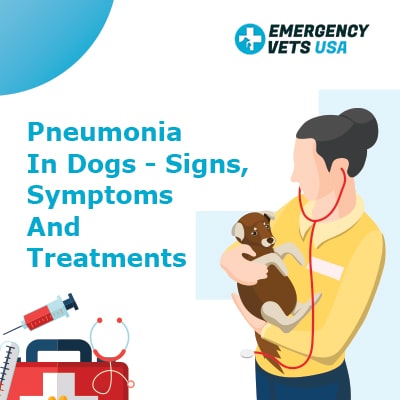Pneumonia in Dogs
Just like people, dogs of all ages can suffer from pneumonia.
Pneumonia develops due to inflammation in the lungs and lower airways.
When the lower airways are inflamed, your dog can have trouble breathing and not get enough oxygen into their bloodstream.
Without treatment, pneumonia can be life-threatening. It’s good to know what to watch out for and when to take your dog to the vet.

Signs & Symptoms of Pneumonia In Dogs
Dogs with pneumonia typically have what we call “respiratory signs”.
However, you may also see your dog have symptoms that are not restricted to the respiratory tract.
Here are some signs you may notice:
- Coughing
- Lethargy
- Fever
- Exercise intolerance
- Difficulty breathing or breathing faster than normal at rest
- Extending neck out to breathe with mouth open
- Weight loss
- Decreased appetite
- Blueish hue to gum color
It is normal and quite common to see if a cough goes away on its own within 2-3 days.
However, if your dog is coughing for more than 3 days or they are showing any of the other symptoms mentioned above, you need to take your dog to the vet.
Causes Of Pneumonia In Dogs
There are various causes of pneumonia in dogs.
The most common causes are viral and bacterial pneumonia.
Dogs can also develop fungal pneumonias and pneumonia secondary to an inhaled irritant. Dogs can also develop pneumonia by aspirating (inhaling) food or medicines.
Bacteria
Bordatella bronchiseptica, the cause of “Kennel Cough”, can cause pneumonia to develop if it gets down into the lower airways.
This particular type of bacteria is definitely contagious and easily spread dog-to-dog.
Other bacterial causes of pneumonia, however, are not necessarily contagious.
These include Streptococcus zooepidemicus, Pasteurella multocida, E. coli, Mycoplasma, among others.
Viruses
Canine Distemper Virus, Adenoviruses, Canine Influenza Virus, and Parainfluenza Virus are viral causes of pneumonia in dogs.
All of these are contagious, but they are also preventable with vaccines.
Viral pneumonia can also make a dog more susceptible to developing a secondary bacterial pneumonia, which can complicate matters.
Fungus
Dogs can inhale fungal spores that can get into their lungs and cause a pneumonia.
The most common fungus that can do this is called Blastomycosis.
Other fungal organisms that can cause pneumonia in dogs are Aspergillus species, Coccidioides immitis, Histoplasma capsulatum, and Cryptococcus neoformans.
Dogs with weakened immune systems are at a higher risk for these infections.
Irritants
Inhaled irritants, such as environmental toxins, cigarette smoke, and cleaning supplies can cause a lot of inflammation in the lower respiratory tract of your dog.
This can lead to an “irritant” pneumonia and also to a secondary bacterial pneumonia.
Aspiration
Aspiration pneumonia occurs when a dog accidentally inhales foreign material.
The most common cause of this is aspirating vomited food particles.
Dogs who are vomiting are at risk for this, as well as dogs who have an abnormality in their throat or esophagus.
Dogs with conditions called megaesophagus and laryngeal paralysis are especially at risk for this, as their normal swallowing apparatus does not function properly.
Diagnosing Pneumonia In Dogs
If you suspect your dog may have pneumonia, they should be evaluated by a veterinarian.
Your vet will do a physical exam and closely listen to your dog’s heart and lungs with their stethoscope.
If they suspect pneumonia, x-rays will be needed to look at your dog’s lungs.
Taking x-rays will help confirm the diagnosis, as well as give an idea as to the underlying cause of the pneumonia.
If your dog’s pneumonia progresses without responding to treatment, your vet may recommend more extensive diagnostics to get to the root of the problem.
These include bronchoscopy and tracheal lavage. These procedures can allow your vet to take samples of your dog’s airways for more specific testing to determine if the pneumonia is due to a resistant bacterial infection, a persistent virus, or potentially lung cancer.
Dog Pneumonia Treatments
Depending on the severity of your dog’s pneumonia, your dog may be able to be treated in the comfort of their home, or they may need to be hospitalized for a few days.
Dogs with difficulty breathing, blueish gum color, or low oxygen blood levels, will likely need to be hospitalized with oxygen therapy and intravenous (IV) fluids.
Intravenous antibiotics will also be given to treat a bacterial pneumonia, whether it is the primary or a secondary cause.
Your vet may also give your dog anti-inflammatory pain medications to help decrease the inflammation in their lungs and address their pain.
If your vet is suspicious of a fungal cause of pneumonia, they will start your dog on anti-fungal medications as well.
How To Treat Your Dog’s Pneumonia At Home
Antibiotics
If your dog’s pneumonia is mild and your vet feels it can adequately be managed at home, your dog can recover in the comfort of their own bed.
You will need to give the antibiotics and other medications your vet prescribes every single day until they are completely gone.
Even if your dog’s cough starts to fade and they seem to be feeling better – finish all the medications completely.
It’s usually best to give antibiotics with food to prevent stomach upset.
Offer your dog tasty, easily digestible canned food in meatballs while your dog is recovering.
It’s best to offer small amounts frequently throughout the day.
Do NOT force feed your dog – this could make the pneumonia worse if they accidentally inhale some of the food.
Nebulization & Coupage
Your dog will also benefit from the process of humidification.
You can do this at home by putting your dog in the bathroom with the door closed.
Run a warm shower for about 15 minutes and do this 2-3 times per day with your dog just standing in the bathroom (not actually in the shower).
At the same time, you can use your hands to gently but firmly tap both sides of your dog’s chest. This process is called “Nebulization and Coupage” and will help to break up the mucus in your dog’s lower airways.
Rest
Keep your dog’s activity level to a minimum until they are at least one week completely pneumonia-free.
Even if they are feeling better and want to be more active, their lungs are still recovering from a lot of inflammation.
Do not let them run around and play, and only take them on short, controlled leash walks to eliminate themselves.
Average Recovery Time For A Dog With Pneumonia
It usually takes a dog at least 3-5 weeks to recover from pneumonia.
Your dog will likely need to be on antibiotics for at least 4 weeks.
The standard is to continue antibiotics for one week past evidence that the pneumonia has cleared up on x-rays.
Your vet may want to recheck a chest x-ray after your dog has been on antibiotics for 2 weeks, which can help gauge how much longer they will need to be rested and on medications.
Recovering from pneumonia takes a long time, but many dogs do heal and are able to get back to their normal activity level.
One thing to keep in mind – if your dog was a very active hunting or agility dog, they may have some scarring in their lungs and will not be able to be completely as active as they used to be.
Be easy on them going forward and you may have to adjust their lifestyle.

Leslie Brooks graduated from the University of Tennessee College of Veterinary Medicine in 2012. After graduation she moved to Indianapolis to do an intensive one-year internship at a specialty practice and then began working as a small animal general practitioner. She ran her own house call practice for three years, visiting pets in people’s homes. Currently, she works part time in clinical practice and volunteering her free time to serve pets of the homeless. Read more about us here.

My dog does have pneumonia on his right side lung, we’re just really worried about him. He seems to improve day by day but what are some other great tips that he’s improving.
I’m glad to hear that he is slowly improving! Pneumonia can have a major impact on a dog’s health, causing a slow recovery in many cases. Some signs that your dog is on the road to recovery include an increase in their appetite, willingness to get up and move around, being awake and alert for longer periods, becoming less winded with small activity, and any other decrease in their original struggles.